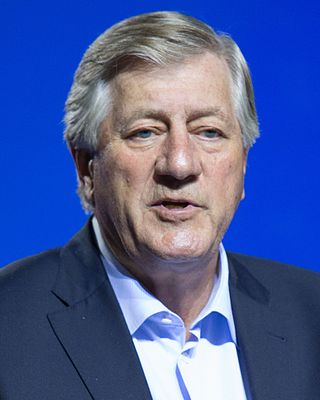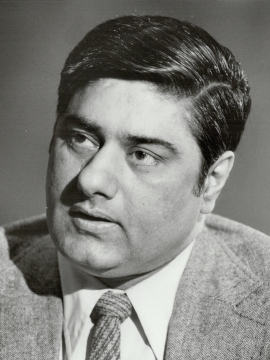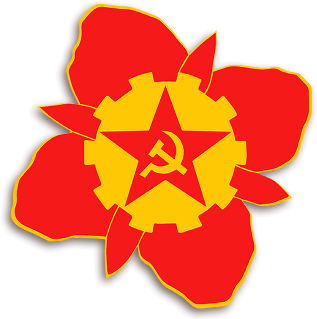
Howard Douglas McCurdy was a Canadian civil rights activist, politician and university professor. He grew up in Southwestern Ontario before moving to the Windsor, Ontario, area. He did his undergraduate work at what is now known as the University of Windsor and doctoral degree at Michigan State University. He became a tenured professor at the University of Windsor and eventually became a department head. In 1980, he entered politics when he was elected to the City of Windsor's council. In 1984, McCurdy entered federal politics when he won a seat in the House of Commons. He was the second Black Canadian to serve in parliament and the first for the New Democratic Party of Canada. He lost his seat during a Liberal Party sweep of Ontario ridings in the 1993 federal election. In 2012 he earned several awards including the Order of Ontario and the Order of Canada. In later life he had many health issues and died in the Windsor-area in 2018.
Elizabeth Shaughnessy Cohen was a Canadian politician who represented the riding of Windsor—St. Clair for the Liberal Party of Canada from 1993 until her death in 1998.

The Communist Party of Trinidad and Tobago was a pro-Albanian Marxist–Leninist political party in Trinidad and Tobago. The party was founded in 1979. One source claims it was founded by Hardial Bains, the leader of Communist Party of Canada (Marxist–Leninist). CPTT published Class Struggle.

Brian S. Masse is a Canadian politician. He has served in the House of Commons of Canada since 2002, representing the riding of Windsor West as a member of the New Democratic Party.
The Communist Party of Canada - Marxist-Leninist (CPC-ML) ran ten candidates in the 2003 Ontario provincial election. They did not use the CPC-ML name but instead campaigned as "Independent Renewal" candidates.
The Progressive Conservative Party of Ontario fielded a full slate of candidates in the 1995 Ontario provincial election, and won a majority government with 82 out of 130 seats. Many of the party's candidates have their own biography pages; information about others may be found here.
The New Democratic Party won thirteen seats in the 2000 federal election, emerging as the fourth-largest party in the House of Commons of Canada. Many of the party's candidates have their own biography pages; information on others may be found here.
The Communist Party of Canada - Marxist-Leninist ran several candidates in the 2004 federal election, none of whom were elected. Information about these candidates may be found on this page.
The Conservative Party of Canada ran a full slate of candidates in the 2004 federal election, and won 99 seats out of 308 to form the Official Opposition. Many of the party's candidates have their own biography pages; information about others may be found here.
The Communist Party of Canada (Marxist-Leninist) ran 65 candidates in the 1997 federal election, none of whom were elected. Information about these candidates may be found on this page.
The Communist Party of Canada (Marxist-Leninist) (CPC-ML) fielded 71 candidates in the 2006 federal election. Some of these candidates have their own biography pages. Information about others may be found here.
The Communist Party of Canada (Marxist-Leninist) fielded 84 candidates in the 2000 federal election, none of whom were elected.
The Communist Party of Canada - Marxist-Leninist ran fifty-one candidates in the 1993 federal election, none of whom were elected. Information about these candidates may be found here.
The 2000 Windsor municipal election was held in the City of Windsor, Ontario to elect a mayor, councillors and school trustees.
The Communist Party of Canada (Marxist-Leninist) fielded fifty-nine candidates in the 2008 Canadian federal election, none of whom were elected. Information about these candidates may be found on this page.
The Parti marxiste–léniniste du Québec fielded twenty-three candidates in the 2008 provincial election, none of whom were elected. Information about these candidates may be found on this page.

The 1999 Ontario general election was held on June 3, 1999, to elect members of the 37th Legislative Assembly of the Canadian province Ontario.
The Revolutionary Communist Party of Britain (Marxist–Leninist) (RCPB-ML) is a small British communist political party, previously named the Communist Party of England (Marxist-Leninist) on formation in 1972 until being reorganised in 1979 after rejecting Maoism and aligning with Albania. The party's thinking is based on the politics of Hardial Bains, who travelled the world founding orthodox (anti-revisionist) communist parties.

Hardial Bains was an Indo-Canadian microbiology lecturer, but was primarily known as the founder of a series of left-wing movements and parties foremost of which was the Communist Party of Canada (Marxist–Leninist). Presenting himself as staunchly anti-revisionist and pro-Stalinist, until his death, Bains acted as the spokesperson and ideological leader of the CPC(M-L) — known in elections as the Marxist–Leninist Party of Canada. During his lifetime, Bains' outlook swung from supporting the Soviet Union under Joseph Stalin, to Mao Zedong's China, then later to Enver Hoxha's Albania. Shortly before he died, and abandoning his previous sharp criticisms of the country, Bains turned to Fidel Castro's Cuba for inspiration. Spending most of his life in Canada, Bains was also politically active in England, Ireland, United States and India.

The Communist Party of Canada (Marxist–Leninist) is a federal political party in Canada. It was founded in 1970 by Hardial Bains, a staunch Stalinist and anti-revisionist. The CPC(M-L) has been registered with Elections Canada as the Marxist–Leninist Party of Canada (MLPC) since 1974, as the party is prohibited from using the name "Communist Party of Canada" in Canadian elections to avoid confusion among voters. The party is not an offshoot of the Communist Party of Canada; its early membership came from student-led organizations active in the 1960s. After a period of alignment with Maoism and China, the CPC(M-L) pursued a Hoxhaist, pro-Albanian line until the early 1990s. At present, the party directs most of its public support to Cuba and North Korea.






